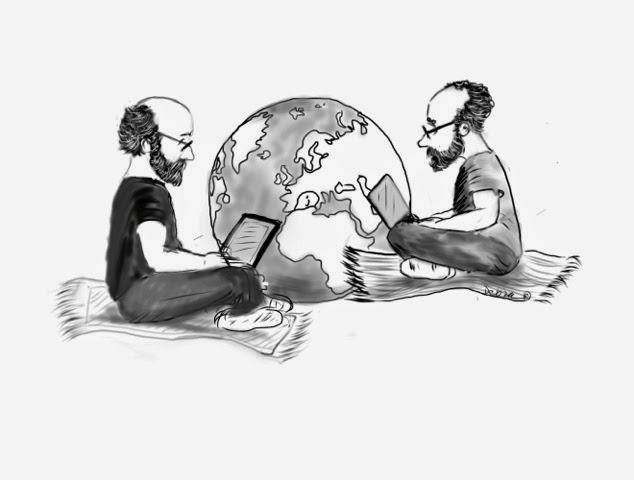I'm about to embark on a project
that I hope might be of as much interest to you as it will be to me.
It's called In the Footsteps of
our Families. Together with my good friend, the American journalist Stu Seidel, a
former senior editor at the US public radio network NPR (that's us in the picture), I'm going to be
exploring the experience of migration through the stories of our own families.
Stu's grandparents and great
grandparents were immigrants to the US from Belarus, Lithuania and Poland. My
parents came to the UK as refugees from Nazi Germany. So we're going to retrace
their footsteps, from the centuries-old Belarussian town of Pastavy, 100 miles
north of Minsk, then west through Lithuania and Poland, and into Germany.
We'll end the European leg of our
journey in Hamburg, once known as the Gateway to the World, from which five
million emigrants embarked on their way to new lives between 1850 and 1939.
Later in the year, we'll pick up in the US and see where Stu's family settled,
first in New Jersey and then in Baltimore.
Why are we doing it? Because,
like an ever-increasing number of people, we have a growing interest in our
families' origins. But also because, as journalists, we can't help but be aware
that migration is one of the biggest challenges facing the world we live in. So
it's only natural that as the son and grandson of immigrants, we're
irresistibly tempted to use our own families' pasts as a way of examining the
present and the future.
And that's why -- I hope -- you
might find our journey interesting as well. Most families have a migration
story or two in their past; in most cases, it's almost impossible to
reconstruct the individual stories from the flimsy evidence that remains. Hence
the popularity of the TV show "Who do you think you are?" which
enables us to enjoy vicariously the search for answers from the past.
I'm luckier than many, because
both my parents wrote memoirs, as did one of my grandfathers. On one side of the
family, I can trace my antecedents back 10 generations, to my great x 8
grandfather, who was born in 1578 in Vilnius, which is one of the destinations
on our forthcoming journey.
As we make our way across Europe
over the next two weeks, we'll meet up with local historians and experts and
talk to them about the migration experience. We'll talk about the twin threats
of war and poverty, the universal drivers of migration, both in the past and
still today.
Think of it as part genealogy,
part travel-writing, part The Hairy
Bikers meets The Trip with Steve
Coogan and Rob Brydon -- plus a dollop of old-fashioned journalism for added
value.
We've already posted a couple of introductory pieces and some archive photos of
our respective families on the website, so click here for what I hope will be the first of many
visits.
